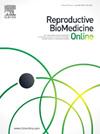MENOPAUSAL SYMPTOMS AND SYSTEMIC INFLAMMATION: A COMPARATIVE STUDY IN PERIMENOPAUSAL AND POSTMENOPAUSAL WOMEN
IF 3.7
2区 医学
Q1 OBSTETRICS & GYNECOLOGY
引用次数: 0
Abstract
Objective
This study aimed to investigate menopausal symptoms and their frequencies while exploring their potential correlation with systemic inflammation in perimenopausal and postmenopausal women.
Materials and Methods
The study involved a comparative analysis of menopausal symptoms and systemic inflammation markers between perimenopausal (n=213) and postmenopausal women (n=219). Participants were assessed with the Menopause Rating Scale (MRS) for somatic, urogenital and psychological symptoms and systemic immune-inflammation index (SII) levels. Regression analysis was conducted to identify parameters strongly associated with high somatic and total MRS scores.
Results
Total MRS and somatic domain scores were found to be significantly higher in perimenopausal women compared to postmenopausal women. Additionally, perimenopausal women exhibited elevated levels of systemic inflammation, as indicated by higher SII levels. Regression analysis revealed that being perimenopausal, being smoker and having higher SII results were the most significant parameters related to increased somatic scores. In contrast, parity and exercise were found to be associated with lower somatic scores.
Conclusion
The findings of this study highlight the heightened somatic symptomatology and systemic inflammation observed in perimenopausal women. Specifically, being in the perimenopausal phase, being a smoker and having elevated systemic inflammation markers were identified as strong factors associated with increased somatic scores. These results underscore the importance of considering systemic inflammation in the management of menopausal symptoms, particularly during the perimenopausal transition.
求助全文
约1分钟内获得全文
求助全文
来源期刊

Reproductive biomedicine online
医学-妇产科学
CiteScore
7.20
自引率
7.50%
发文量
391
审稿时长
50 days
期刊介绍:
Reproductive BioMedicine Online covers the formation, growth and differentiation of the human embryo. It is intended to bring to public attention new research on biological and clinical research on human reproduction and the human embryo including relevant studies on animals. It is published by a group of scientists and clinicians working in these fields of study. Its audience comprises researchers, clinicians, practitioners, academics and patients.
Context:
The period of human embryonic growth covered is between the formation of the primordial germ cells in the fetus until mid-pregnancy. High quality research on lower animals is included if it helps to clarify the human situation. Studies progressing to birth and later are published if they have a direct bearing on events in the earlier stages of pregnancy.
 求助内容:
求助内容: 应助结果提醒方式:
应助结果提醒方式:


